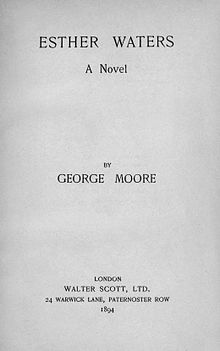
Esther Waters is a novel by George Moore first published in 1894.

Esther Waters is a novel by George Moore first published in 1894.
Set in England from the early 1870s onward, the novel is about a pious young woman from a poor working-class family who, while working as a kitchen maid, is seduced by another employee, becomes pregnant, is deserted by her lover, and against all odds decides to raise her child as a single mother. Esther Waters is one of a group of Victorian novels that depict the life of a "fallen woman".
Written in a naturalistic style similar to that of Émile Zola, the novel stands out among Moore's publications as the book whose immediate success, including William Ewart Gladstone's approval of the novel in the Westminster Gazette , [1] brought him financial security. Continuously revised by Moore (1899, 1917, 1920, 1931), it is often regarded as his best novel.
Esther Waters is dedicated to T. W. Rolleston.
Esther Waters is born to hard-working parents who are Plymouth Brethren in Barnstaple, Devon. Her father's premature death prompts her mother to move to London and marry again, but Esther's stepfather turns out to be a hard-drinking bully and wife-beater who forces Esther, a natural beauty, to leave school and go out to work instead, thus greatly reducing her chances of ever learning how to read and write, and Esther remains illiterate all her life.
Her first job outside London is that of a kitchen maid with the Barfields, a nouveau riche family of horse breeders, horse racers and horse betters who live at Woodview near Shoreham. There she meets William Latch, a footman, and is seduced by him. Dreaming of a future with Latch, she is dismayed to find that he is having an affair with the Barfields' niece, who is staying at Woodview. After Latch and his lover have eloped together, Esther stays on at Woodview until she cannot hide her pregnancy any longer. Although she has found a kindred soul in Mrs Barfield, who is also a Plymouth Sister and abhors the betting on horses going on all around her, Esther is dismissed ("I couldn't have kept you on, on account of the bad example to the younger servants") and reluctantly goes back to London.
With the little money she has saved, she can stay in a rented room out of her stepfather's sight. Her mother is pregnant with her eighth child and dies giving birth to it at the same time Esther is at Queen Charlotte's Hospital giving birth to a healthy boy she calls Jackie. Still in confinement, she is visited by her younger sister who asks her for money for her passage to Australia, where her whole family have decided to emigrate. Esther never hears of them again.
Learning that a young mother in her situation can make good money by becoming a wet nurse, Esther leaves her newborn son in the care of a baby farmer and nurses the sickly child of a wealthy woman ("Rich folk don't suckle their own") who, out of fear of infection, forbids Esther any contact with Jack. When, after two long weeks, she finally sees her son again, realises that he is anything but prospering and even believes that his life might be in danger, she immediately takes him with her, terminates her employment without notice and then sees no other way than to "accept the shelter of the workhouse" for herself and Jack.
But Esther is lucky, and after only a few months can leave the workhouse again. She chances upon Mrs Lewis, a lonely widow living in East Dulwich who is both willing and able to raise her boy in her stead, while she herself goes into service again. However, she is not able to really settle down anywhere: either the work is so hard and the hours so long that, fearing for her health, she quits again; or she is dismissed when her employers find out about the existence of her illegitimate son, concluding that she is a "loose" woman who must not work in a respectable household. Later on, while hiding her son's existence, she is fired when the son of the house, in his youthful fervour, makes passes at her and eventually writes her a love letter she cannot read.
Another stroke of luck in her otherwise dreary life is her employment as general servant in West Kensington with Miss Rice, a novelist who is very sympathetic to her problems. While working there, she makes the acquaintance of Fred Parsons, a Plymouth Brother and political agitator, who proposes to Esther at about the same time she bumps into William Latch again while on an errand for her mistress. Latch, who has amassed a small fortune betting on horses and as a bookmaker, is the proprietor of a public house in Soho and has separated from his adulterous wife, waiting for his divorce to be completed. He immediately declares his unceasing love for Esther and urges her to live with him and work behind the bar of his pub. Esther realises that she must make up her mind between the sheltered, serene and religious life Parsons is offering her—which she is really longing for—and sharing the financially secure but turbulent existence of a successful small-time entrepreneur who, as she soon finds out, operates on both sides of the law. Eventually, for the sake of her son's future, she decides to go to Soho with Latch, and after his divorce has come through the couple get married.
A number of years of relative happiness follow. Jack, now in his teens, can be sent off to school, and Esther even has her own servant. But Latch is a gambler, and nothing can stop him from risking most of the money he has in the hope of gaining even more. Illegal betting is conducted in an upstairs private bar, but more and more also across the counter, until the police clamp down on his activities, his licence is revoked, and he has to pay a heavy fine. This coincides with Latch developing a chronic, sometimes bloody, cough, contracting pneumonia, and finally, in his mid-thirties, being diagnosed with tuberculosis ("consumption"). However, rather than not touching what little money he still has for his wife and son's sake, the dying man puts everything on one horse, loses, and dies a few days later.
With Miss Rice also dead, Esther has no place to turn to and again takes on any menial work she can get hold of. Then she remembers Mrs Barfield, contacts her and, when asked to come to Woodview as her servant, gladly accepts while Jack, now old enough to earn his own living, stays behind in London. When she arrives there, Esther finds the once proud estate in a state of absolute disrepair, with Mrs Barfield the only inhabitant. Mistress and maid develop an increasingly intimate relationship with each other and, for the first time in their lives, can practise their religion unhindered. Looking back on her "life of trouble and strife," Esther, now about 40, says she has been able to fulfil her task—to see her boy "settled in life," and thus does not see any reason whatsoever to want to get married again. In the final scene of the novel, Jack, who has become a soldier, visits the two women at Woodview.
Moore's fellow late nineteenth-century novelist George Gissing wrote there was "some pathos and power in latter part, but miserable writing. The dialogue often grotesquely phrased". [2]
In a 1936 review of a series of books published by The Bodley Head and Penguin Books, appearing in The New English Weekly , George Orwell described Esther Waters as "far and away the best" of the 10 books in the series. Describing the novel as Moore's best and comparing it to W. Somerset Maugham's Of Human Bondage , Orwell noted certain stylistic flaws but argued its "fundamental sincerity makes its surface faults almost negligible." [3]
The reason why Moore chose Esther Waters rather than one of his lesser known novels (which he might have been able to promote that way) to be adapted for the stage may have been its "Englishness". The subject-matter of Esther Waters was the most "English" of his novels, and Moore had just returned to England after abandoning his brief interest in the Irish Renaissance theatre movement. 1911, then, saw the première, at the Apollo Theatre in London's West End, of Esther Waters: a play in five acts, which Moore had adapted from his own novel. Although it did not receive good reviews, Moore was pleased with the production. In 1913 Heinemann published the playscript.
There are, however, two more versions of the play. One was the result of an unsuccessful collaboration, in 1922, between Moore and theatre critic Barrett H. Clark; a third version of the play was written by Clark in the same year, but never performed. The two 1922 versions were first published in 1984. [4]
Esther Waters was filmed in 1948 by Ian Dalrymple and Peter Proud with Kathleen Ryan (in the title role), Dirk Bogarde (as William Latch), Cyril Cusack, Ivor Barnard and Fay Compton. It was partly filmed at Folkington Manor, East Sussex. Two television dramas (miniseries) were produced in 1964 and 1977 respectively. [5]
In 1964 the BBC produced a four-part miniseries of Esther Waters , with Meg Wynn Owen in the title role. [6] A further television adaptation Esther Waters aired on the BBC in 1977, featuring Gabrielle Lloyd as Waters.

Vanity Fair is a novel by the English author William Makepeace Thackeray, which follows the lives of Becky Sharp and Amelia Sedley amid their friends and families during and after the Napoleonic Wars. It was first published as a 19-volume monthly serial from 1847 to 1848, carrying the subtitle Pen and Pencil Sketches of English Society, which reflects both its satirisation of early 19th-century British society and the many illustrations drawn by Thackeray to accompany the text. It was published as a single volume in 1848 with the subtitle A Novel without a Hero, reflecting Thackeray's interest in deconstructing his era's conventions regarding literary heroism. It is sometimes considered the "principal founder" of the Victorian domestic novel.
Baby farming is the historical practice of accepting custody of an infant or child in exchange for payment in late-Victorian Britain and, less commonly, in Australia, New Zealand and the United States. If the infant was young, this usually included wet-nursing. Some baby farmers "adopted" children for lump-sum payments, while others cared for infants for periodic payments.

The Way of All Flesh is a semi-autobiographical novel by Samuel Butler that attacks Victorian-era hypocrisy. Written between 1873 and 1884, it traces four generations of the Pontifex family. Butler dared not publish it during his lifetime, but when it was published posthumously in 1903 as The Way of All Flesh it was accepted as part of the general reaction against Victorianism. Butler's first literary executor, R. A. Streatfeild, made substantial changes to Butler's manuscript. The original manuscript was first published in 1964 as Ernest Pontifex or the Way of All Flesh by Houghton Mifflin Company, Boston, edited by Daniel F. Howard.

Coming Up for Air is the seventh book and fourth novel by the English writer George Orwell, published in June 1939 by Victor Gollancz. It was written between 1938 and 1939 while Orwell spent time recuperating from illness in French Morocco, mainly in Marrakesh. He delivered the completed manuscript to Victor Gollancz upon his return to London in March 1939.
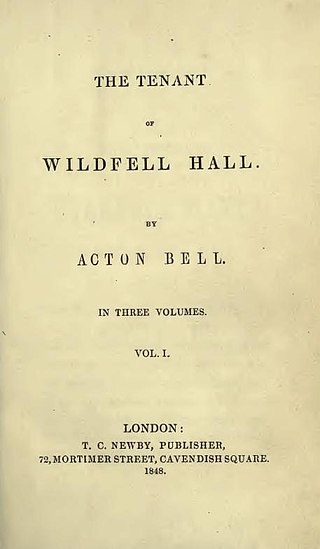
The Tenant of Wildfell Hall is the second and final novel written by English author Anne Brontë. It was first published in 1848 under the pseudonym Acton Bell. Probably the most shocking of the Brontës' novels, it had an instant and phenomenal success, but after Anne's death her sister Charlotte prevented its re-publication in England until 1854.
The Heart of the Matter (1948) is a novel by English author Graham Greene. The book details a life-changing moral crisis for Henry Scobie. Greene, a former British intelligence officer in Freetown, British Sierra Leone, drew on his experience there. Although Freetown is not mentioned in the novel, Greene confirms the location in his 1980 memoir, Ways of Escape.
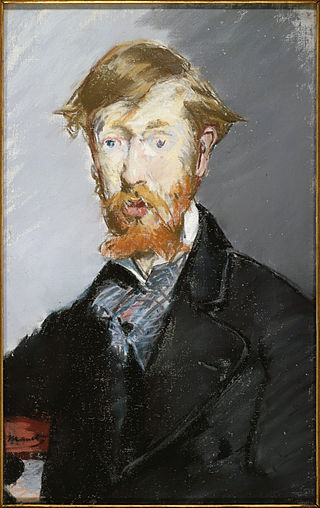
George Augustus Moore was an Irish novelist, short-story writer, poet, art critic, memoirist and dramatist. Moore came from a Roman Catholic landed family who lived at Moore Hall in Carra, County Mayo. He originally wanted to be a painter, and studied art in Paris during the 1870s. There, he befriended many of the leading French artists and writers of the day.

A Clergyman's Daughter is a 1935 novel by English author George Orwell. It tells the story of Dorothy Hare, the titular clergyman's daughter, whose life is turned upside down when she suffers an attack of amnesia. It is Orwell's most formally experimental novel, featuring a chapter written entirely in dramatic form, but he was never satisfied with it and he left instructions that after his death it was not to be reprinted. Despite these instructions, Orwell did consent to the printing of cheap editions "of any book which may bring in a few pounds for my heirs" following his death.

Bleak House is a novel by English author Charles Dickens, first published as a 20-episode serial between 12 March 1852 and 12 September 1853. The novel has many characters and several subplots, and is told partly by the novel's heroine, Esther Summerson, and partly by an omniscient narrator. At the centre of Bleak House is a long-running legal case in the Court of Chancery, Jarndyce and Jarndyce, which comes about because a testator has written several conflicting wills. In a preface to the 1853 first edition, Dickens said there were many actual precedents for his fictional case. One such was probably Thellusson v Woodford, in which a will read in 1797 was contested and not determined until 1859. Though many in the legal profession criticised Dickens's satire as exaggerated, Bleak House helped support a judicial reform movement that culminated in the enactment of legal reform in the 1870s.

Trilby is a sensation novel by George du Maurier and one of the most popular novels of its time. Published serially in Harper's New Monthly Magazine from January to August 1894, it was published in book form on 8 September 1894 and sold 200,000 copies in the United States alone. Trilby is set in the 1850s in an idyllic bohemian Paris. Though Trilby features the stories of two English artists and a Scottish artist, one of the most memorable characters is Svengali, a rogue, masterful musician and hypnotist.
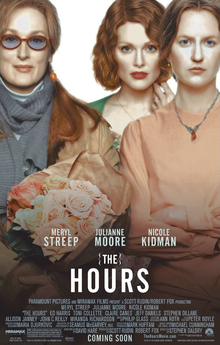
The Hours is a 2002 psychological period-drama film directed by Stephen Daldry, from a screenplay by David Hare based on Michael Cunningham's 1999 novel. It stars Nicole Kidman, Julianne Moore and Meryl Streep as three women whose lives that are connected by Virginia Woolf's 1925 novel Mrs Dalloway. In 2001 New York, Clarissa Vaughan (Streep) prepares an award party for her AIDS-stricken friend and poet, Richard. In 1951 California, Laura Brown (Moore) is a pregnant housewife in an unhappy marriage. In 1920s England, Virginia Woolf (Kidman) battles with depression while writing Mrs Dalloway. Supporting roles are played by Ed Harris, John C. Reilly, Stephen Dillane, Jeff Daniels, Miranda Richardson, Allison Janney, Toni Collette, Claire Danes, and Eileen Atkins.
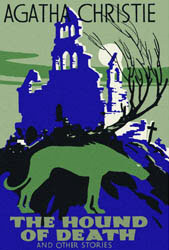
The Hound of Death and Other Stories is a collection of twelve short stories by British writer Agatha Christie, first published in the United Kingdom in October 1933. Unusually, the collection was not published by Christie's regular publishers, William Collins & Sons, but by Odhams Press, and was not available to purchase in shops.
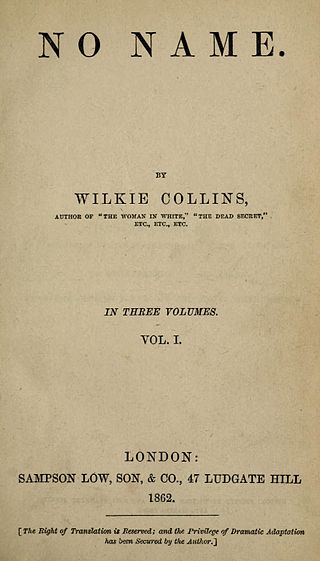
No Name is an 1862 novel by Wilkie Collins. Illegitimacy is a major theme of the novel. It was originally serialised in Charles Dickens's magazine All the Year Round before book publication. It is the second of his four "great novels", released after The Woman in White (1860) and before Armadale (1866) and The Moonstone (1868).

Angel Pavement is a novel by J. B. Priestley, published in 1930 after the enormous success of The Good Companions (1929).

Folkington Manor is a grade II* listed country house situated in the village of Folkington two miles (3.2 km) west of Polegate, East Sussex, England.
Gallia is an 1895 novel written by Ménie Muriel Dowie. It is usually categorised as a New Woman novel.

"Fallen woman" is an archaic term which was used to describe a woman who has "lost her innocence", and fallen from the grace of God. In 19th-century Britain especially, the meaning came to be closely associated with the loss or surrender of a woman's chastity and with female promiscuity. Its use was an expression of the belief that to be socially and morally acceptable, a woman's sexuality and experience should be entirely restricted to marriage, and that she should also be under the supervision and care of an authoritative man. Used when society offered few employment opportunities for women in times of crisis or hardship, the term was often more specifically associated with prostitution, which was regarded as both cause and effect of a woman being "fallen". The term is considered to be anachronistic in the 21st century, although it has considerable importance in social history and appears in many literary works.

Esther Waters is a 1948 British drama film directed by Ian Dalrymple and Peter Proud and starring Kathleen Ryan, Dirk Bogarde, and Cyril Cusack. It is an adaptation of the 1894 novel Esther Waters by George Moore.

Esther Waters is a British period television series which originally aired on BBC 2 in four episodes from 14 November to 5 December 1964. It is an adaptation of the 1894 novel of the same title by George Moore. Like the novel it focuses on the struggle of Esther Waters who, in Victorian England, is abandoned by her lover when pregnant. Despite the social stigma of being a fallen woman she chooses to raise the child as a single mother.
Esther Waters is a British period television series which originally aired on BBC Two in four episodes from 10 April to 1 May 1977. It is an adaptation of the 1894 novel of the same title by George Moore. A previous BBC version Esther Waters had been produced in 1964, although it is now lost.